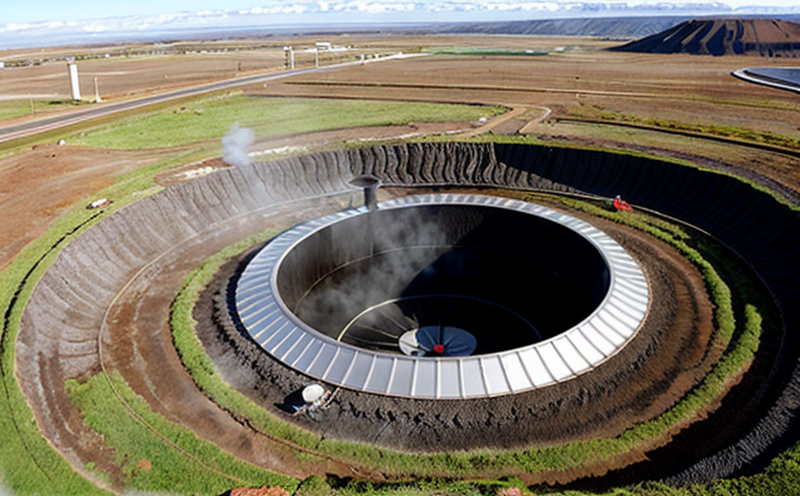ISO 19208 Structural Integrity Testing of Geothermal Installations
The ISO 19208 standard provides a framework for assessing structural integrity in geothermal installations. This service is crucial for ensuring the long-term performance and safety of geothermal systems, which play an increasingly significant role in global renewable energy strategies.
Structural integrity testing ensures that critical components such as heat exchangers, piping, and well casings are capable of withstanding the harsh environmental conditions characteristic of geothermal operations. This is particularly important given the corrosive nature of geothermal fluids, which can contain high levels of salts and other minerals.
The process begins with a thorough review of design specifications and operational parameters to identify potential stress points in the system. From there, we select appropriate test specimens that reflect real-world conditions. These might include coupons or sections of piping subjected to specific temperatures, pressures, and fluid compositions.
Once the test specimens are prepared, they undergo a series of mechanical tests designed to simulate the operational environment. Common tests include tensile strength, elongation under load, and fatigue testing. Additionally, non-destructive evaluation techniques such as ultrasonic testing (UT) or radiographic inspection may be used to assess internal integrity without damaging the specimen.
After completing all necessary tests, our team of experts analyze the results using advanced software tools to determine compliance with ISO 19208 requirements. Compliance ensures that the geothermal installation can operate safely and efficiently over its expected lifespan.
The results from this testing are invaluable for quality managers and R&D engineers looking to optimize design parameters or improve material choices. Compliance officers will find these reports essential for maintaining regulatory standards, while procurement teams can use them to source high-quality materials and components.
Real-world applications of ISO 19208 structural integrity testing include the certification of new geothermal plants and the periodic inspection of existing facilities to ensure continued safety and efficiency. By adhering to this standard, operators contribute to a more sustainable energy future by extending the useful life of critical infrastructure without compromising on operational performance.
The benefits extend beyond just compliance; they also enhance reputation and reduce risk for stakeholders involved in geothermal projects.
Scope and Methodology
| Test Type | Description | Methodology |
|---|---|---|
| Tensile Strength Testing | Determines the maximum amount of tensile stress that a material can withstand before failure. | Specimens are mechanically loaded until they break, and the load at which this occurs is recorded. |
| Elongation Under Load | Metric for measuring how much an object stretches under applied force. | The specimen's elongation is measured before and after loading to determine its flexibility. |
| UT Inspection | Uses high-frequency sound waves to detect flaws within materials without destroying them. | Ultrasound equipment is used to scan the material for internal defects or inclusions. |
| Fatigue Testing | Evaluates how well a material resists cyclic loading and unloading stress cycles over time. | Specimens are subjected to repeated load cycles until failure occurs. |
The above tests provide comprehensive insights into the structural integrity of geothermal installations, ensuring they meet stringent international standards like ISO 19208. This approach helps prevent premature failures and extends the operational life of these critical systems.
Environmental and Sustainability Contributions
The implementation of ISO 19208 structural integrity testing in geothermal installations contributes significantly to environmental sustainability by promoting efficient use of resources. By identifying weak points early, operators can take corrective actions before significant damage occurs, reducing waste and minimizing the need for replacement components.
Moreover, this standard helps reduce greenhouse gas emissions associated with geothermal energy production. Longer-lasting systems mean fewer replacements, which translates to less material usage overall. Additionally, by ensuring optimal performance, ISO 19208 supports the efficient conversion of geothermal resources into electrical power, further enhancing environmental benefits.
Quality managers and compliance officers can leverage this testing to meet regulatory requirements while demonstrating a commitment to sustainability. This not only helps in maintaining a positive brand image but also attracts stakeholders who prioritize green initiatives.
Competitive Advantage and Market Impact
ISO 19208 structural integrity testing offers significant competitive advantages by providing operators with detailed insights into their geothermal installations' performance. These insights can be used to refine designs, select superior materials, and implement best practices that enhance operational efficiency.
By adhering to this standard, companies can differentiate themselves in the market by offering safer, more reliable, and longer-lasting geothermal systems. This is particularly important as the demand for renewable energy sources continues to grow globally.
The data generated from ISO 19208 testing also provides valuable input for research and development activities. Engineers can use this information to innovate new technologies that improve the durability and efficiency of geothermal installations. Such advancements contribute to a more competitive position in the industry, fostering growth and expansion.
In summary, implementing ISO 19208 structural integrity testing is not just about compliance; it’s about staying ahead in an increasingly competitive market driven by sustainability goals. It ensures that companies are well-prepared to meet future challenges while continuously improving their offerings.





